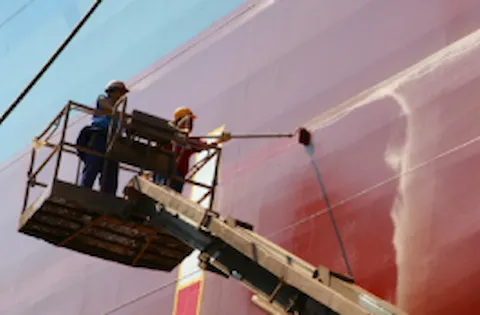Cybutryne banned in anti-fouling systems from 1 January 2023
In July 2021, at the 76th session of the Marine Environment Protection Committee (MEPC 76), the IMO adopted an amendment to the International Convention on the Control of Harmful Anti-fouling Systems on Ships (AFS Convention). This statutory news describes this requirement in more detail and provides recommendations for a smooth process towards compliance.
Relevant for shipyards, coating manufacturers as well as ship owners and managers.
In addition to the already prohibited organotin compounds which act as biocides (try butyl tin, TBT) in anti-fouling systems, the ingredient cybutryne (CAS No. 28159-98-0) will be prohibited as per the amendments to the AFS Convention entering into force on 1 January 2023. The affected ship types and effective dates are listed in the table below:
| Anti-fouling system | Control measures | Application | Effective date |
| Cybutryne CAS No. 28159-98-0 | Ships shall not apply or re-apply anti-fouling systems containing this substance. | All ships | 1 January 2023 |
| Cybutryne CAS No. 28159-98-0 | Ships bearing an anti-fouling system that contains this substance in the external coating layer of their hulls or external parts or surfaces on 1 January 2023 shall either: (1) remove the anti-fouling system; or (2) apply a coating that forms a barrier to this substance leaching from the underlying non-compliant anti-fouling system. | All ships except: (1) fixed and floating platforms, FSUs and FPSOs that have been constructed prior to 1 January 2023 and that have not been in dry-dock on or after 1 January 2023; (2) ships not engaged in international voyages; and (3) ships of less than 400 gross tonnage engaged in international voyages, if accepted by the coastal state(s). | At the next scheduled renewal of the anti-fouling system after 1 January 2023, but no later than 60 months following the last application to the ship of an anti-fouling system containing cybutryne. |
The International AFS certificate will change as of 1 January 2023 to include extra cybutryne tick boxes for the compliance options on controlled anti-fouling systems.
Ships in operation will need to comply with the requirement within the first anti-fouling renewal survey after 1 January 2023 and will be issued a new International AFS certificate which includes cybutryne-free compliance.
Ships under construction, which will be delivered after 1 January 2023, will need to be delivered as both TBT and cybutryne-free, and will be issued with an AFS certificate at the initial survey.
Recommendations
DNV advises its customers to remain aware of vessel and fleet survey and docking schedules for both newbuildings and fleets in service for anti-fouling purchases. These should be accompanied by cybutryne-free statements from the manufacturers in order to obtain an AFS certificate from the attending surveyor.
Furthermore, DNV recommends reviewing the Compliance Planner in My Services on Veracity (for customers only) to obtain a vessel-specific overview of the deadlines for complying with the amendments of the AFS Convention.
For vessels that find themselves unable to comply with the AFS compliance deadline, kindly inform DNV in due course before 1 January 2023.
References
- MEPC.331(76) – adopted on 17 June 2021 – Amendments to the International Convention on the Control of Harmful Anti-Fouling Systems On Ships, 2001
- Anti-fouling systems webpage
- Compliance Planner webpage
Contact
- For customers:
DATE - Direct Access to Technical Experts via My Services on Veracity. - Otherwise:
Use our office locator to find the nearest DNV office.
